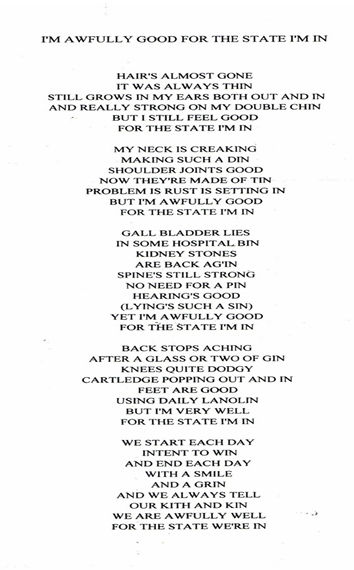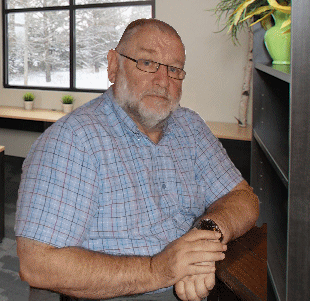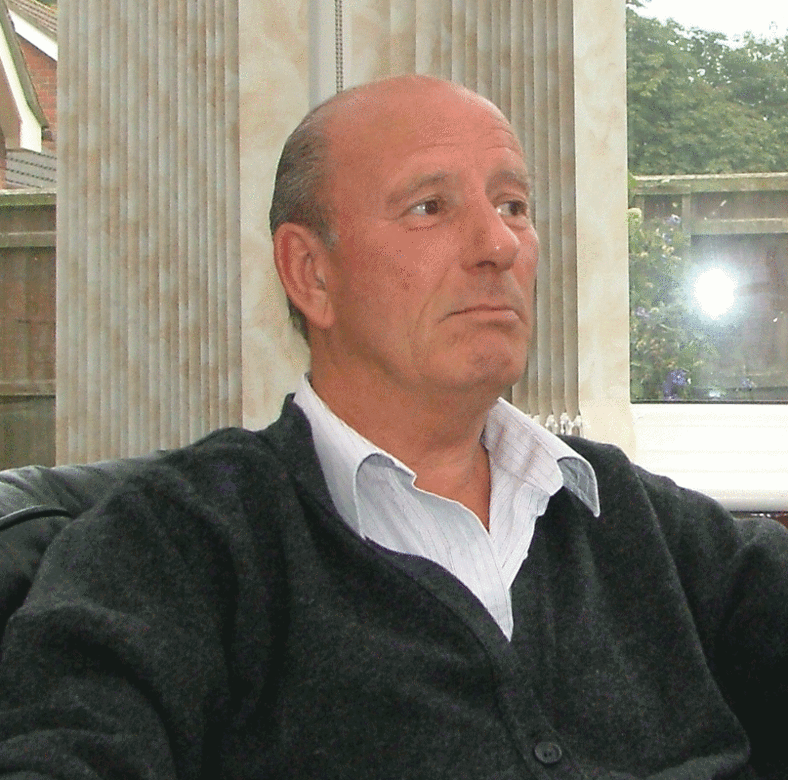Founded 1980
Chair:
Secretary:
Treasurer:
Graham Smith
Jan Thompson
Graham Mumby-Croft
YOUR LETTERS
Sadly, and once again, there has been no correspondence to me other than the regular and interesting communication from my good friend Bob Duncan, whose steadfast contact with his own circle of friends and colleagues is vast, but as he comments in his jottings the list is diminishing by the years and his contribution is becoming more difficult. If this section of the newsletter is to survive I need to have some content to publish on your behalf so once again I appeal to you on behalf of the page put your pens to paper or fingers to keyboard and let our readers, your friends and colleagues, have the benefit of some glimpse into your life in retirement. R
Your Correspondent - Bob Duncan
Firstly, I would like to thank all the colleagues who sent good wishes for my Birthday, I was very touched. Once you reach into the eighties you begin to look over your shoulder to glimpse at what be creeping up, especially as so many dear colleagues have departed, several younger than me. Retirement should be a time of relaxation and enjoyment. It is, but we need to face up to the fact we can no longer do as much, or not as quickly as we used to. It is not an easy transition but one that eventually dawns. Hence written communication is now critical to the RPGA, as travel to a gathering is no longer feasible for so many. It is but a memory only when one could count on over a hundred at a reunion! Oh, happy days.
I was saddened by the news of the passing of Mel Dickenson; we were together for awhile at Wakefield Prison, though I always had difficulty when Mel and Ivan were together deciding which was which. Mel had a reasonable laid-back approach to work, he was highly respected by staff, and he radiated in personality; any contact with Mel always made you feel so much better, he was so positive about life and lived it to the full. I have in my head that he took to gardening in retirement and was also involved it a lot of charity work. Just sitting back and thinking about Mel creates so many happy memories. It was a privilege to have known them both.
Two members from my staff course in 1964 at Love Lane, Christopher Jarman and Kate Warburton, as she was then, both left the Service after a few years. Kate became a Probation Officer, but in retirement was on The Board of Visitors at Onley Prison. Kit undertook training for the Priesthood, was made a Deacon in June 71 and ordained as a Priest June 1972 at Gloucester Cathedral. He had served at St. James Church near Cheltenham. In October 1973 he joined the Royal Navy as a Chaplain. He retired from the Navy in late 1993 and took up residence in Scotland and became the Rector of Holy Trinity Scottish Episcopal Church in Sterling. He was very ill for awhile and had to actually learn to walk again and was assisted in this by many volunteers. He is fully recovered and now as busy as ever. He met up with Kate, whose husband Brian had died of cancer, and they decided to get married which took place in a lovely college chapel in Oxford where Kate had been a student and to which I was invited . He has just celebrated 50 years as a Priest at a special service at Gloucester Cathedral. I was invited, but the operation I had been waiting for 9 months to take place suddenly happened, and I was still in post Op Recovery. They kindly sent me a copy of the Order of Service which contained a page on the ‘Breeches Bible’. I include it below for those who like to collect historical information. A lovely little story posted on the social media by Christine Duffin:
I know I shouldn’t have done this, but I am 83 years old and I was in the McDonald’s drive through this ma morning and the young lady behind me leaned on her horn and started mouthing something because I was taking too long too long to place my order. So when I got to the first window I paid for her order along with my own. The cashier must have told her what I ‘d done because as we moved upsh leaned out of her window waved to mealy mouthed ‘Thank you ‘obviously embarrassed that I had repaid her rudeness with kindness. When I got to the second window, I showed them both receipts and took her food too. Now she has to go back to the end of the queue and start all over again .
Spoke to Veronica Bird, she has kept well during these troubled times and has actually been even busier giving her talks on the Prison Service. At one several local Mayors attended as well as the Chief Constable. She has also been an adviser to a film company which is making a documentary about a female Prison, which will probably be shown on TV in August. Veronica wrote ‘I hope it is not a lot of rubbish. The Producer says I was fine and it could not have been done without me.’ We shall have to wait and see. All fees she receives from the talks are donated to the Ukraine at the moment instead of the Butler Trust
and local Hospice. She has also met several refugees from the Ukraine and they are so grateful to be in England and are such pleasant people all of them want to find work to pay their way. She has also been in touch with Margaret Middlemas who is also well.
Editor's Note: The programme went out in August on Channel 5. Those who saw it will judge for themselves.
Post operation my Doctor has monitored the recovery by regular blood tests, I then receive a phone call or a text message to let me know the results which have been satisfactory, so I have not seen my Doctor for probably 2 years. On a recent blood test she was in the corridor, so I stopped to say 'hallo'. She did not appear in a hurry, and for some reason she enquired as to what I did before retirement. I told her and she replied ‘How interesting, one of my nephews was the Governor of Canterbury Prison.' I looked it up, and it was Major Stratford Tuke, who was Governor there from 1983 until he retired in 1987. I knew of him but did not really know him but, some of our colleagues might.
In the last edition of the Newsletter I included a poem from material sent to me by Shelia Blakey. The renowned but rather overlooked poet, Jim Blakey decided he could do better and composed his own version about himself, and is happy to share it. See Below.
Dominic Raab, the justice secretary claimed that he was confident that the construction and establishment of the first ‘secure school’ within a prison, is the correct solution for the ‘failing’ youth custody system. It will give them a formal education and training so they can secure a job on release. I do not decry the aim, but do object to the pompous advocacy that this is a great and new innovation. From
1902 and rejuvenated in 1922 by Alexander Paterson, there was a well established national Borstal System totally dedicated to these very aims, with all staff in civilian clothes, well established Education Facilities, offering basic education as well as range of subjects at ‘O’ level. Also trade training workshops with skilled instructors in such trades as; painting and decorating, plastering, industrial cleaning, brickwork, motor mechanics, animal welfare, cooking and catering and jam making. Sporting activities played a major role and I can recall both playing in the Borstal Rugby team and training with the lads’ cross country team from my unit. Many had sports days once a year when the whole establishment went to the sports field and parents were invited to come and spectate and, in my time, never created any problems or incidents. The central focus of Borstals was on ‘the lads’ and their needs. Staff were committed and cared.
The trainees had to earn their date of release, so there was an incentive for them to tackle their individual training plans.
I was summoned 1981 to come to Headquarters on Christmas eve to see Colin Honey the Head of Personnel at the Prison Department. He was a person I held in high respect. He said I know you really want a posting in the Oxford area due to your children being at schools there. However, I have a specific request from the Board of Visitors at Wellingborough Borstal, and hence backed by the Regional Director, for a younger Governor. The last three governors were at the end of their careers and all retired from there, and the Board’s view is they let the establishment get ‘run down’. So, you are the perfect choice, and it not a bad road from there to Oxford. (That was a slight exaggeration on a normal day, and just chaos if Silverstone was operating), I recorded soon after taking up post. I had to admit that Wellingborough offered a fresh challenge, but where I felt refreshed, enlivened and optimistic. Here was an establishment where lives could be changed; if opportunities were taken up by the residents, they could give themselves a fresh start in life. One small example, I have kept in touch with the Chaplain there for 20 years into retirement. He advised me with great joy how one of his ‘orderlies’ who had been confirmed at the Borstal, had many years later trained to be a minister in the Church of England.
Then the bolt out of the blue was the idiotic decision by Senior Officials and Politicians to cease the concept of Borstal Training and turn them all into mini prisons called Youth Custody Centres, with the Courts passing fixed sentences. At the same time, it also removed the civilian dress of all Borstal Officers and placed them in uniform; not something 90% of the staff there happy about. I wrote in my 1983 Annual Report to the Director:
'1983 saw the demise of Borstal and the advent of Youth Custody. This meant significant change, the more so for Wellingborough as it took pride in its traditional approach to Borstal Training. Perhaps the system required a ‘shot in the arm’, a degree of revitalization. When the Borstal sentence was 6 months compulsory and up to 2 years, inmates had to earn an early release by working with staff on all the areas deemed necessary, before the Discharge Board would recommend their release and this also had to be agreed by the Board of Visitors (as they were then) prior to release. That has now to be achieved within the confines of a more structured and regulated framework. Most of the work required by this framework, e g Earliest Date of release calculations, new pay system, the core day concept, and even parole documentation preparation was non productive in itself in terms of training and preparation for release: but was time consuming of staff resources.
Staff have all displayed great tolerance, ingenuity, resilience, and application to the demands of the formal changes required and to the change in the inmate culture since the advent of Youth Custody. Meaningful change cannot be imposed and be met with general acceptance. The ethos and culture of a living community is not imposed, it emerges out of the daily interchange of ideas and views of staff, inmates, outside and culture of a living community is not imposed. At Wellingborough there is a solid store of commitment, tradition and common sense on which to draw. This must not be lost by expecting too much too soon.
The young men are much the same, their sentences, nor is their image of themselves. Many have adopted the only other self perception they know –the stereotype of a young prisoner. They feel the need to be more macho, demonstrate violence more readily, are more demanding about material conditions and possessions, and now talk of rights and entitlements. The situation now has deteriorated even more with most young offenders serving their sentences in large overcrowded local adult prisons with little or no specific training related to their needs.'
Had a long chat with Dave Simons on the phone, he is keeping well but does not venture far these days, he says his car has only travelled 7000 miles in 6 years. He states his daughter is keeping ‘an eye on him’; she works in Birmingham, and she managed to get 2 tickets for the swimming events. He was surprised
at the number of seats at the pool that were empty, especially as it is so difficult to get tickets. He said the whole atmosphere at the games was electric and a credit to Birmingham. He confessed that he and Ann and different views as to what they liked watching on TV, so they had 2 sets in different rooms;
Ann’s was in the room backing on to the garden. So, if he has been out there pottering and thinks of something he wants to tell her as he comes in now, he just talks away, then suddenly realised the chair is empty. I was touched for him and his deep love of Ann.
We naturally talked about Service days and people we remembered; he reminded me that his last post was at Highpoint. In those days we all had to retire at 60. Dave kept contacting Headquarters to ask when his replacement was going to be appointed, and the only answer was soon, you had better stay in post for another 3 months. He actually had to wait 6 months! It did though all add to his pension.
Now a piece of useless information, Sir Martin Narey, who was the Director General of the Service for a period and then chief executive of Barnardo’s (2005-2011) was 67 on August 5, 2022.
Saddened to hear of the death of Colin Honey but at almost 93 years of age, he had a good innings! I had quite a lot of contact with Colin over the years especially over my 2 postings to the Staff College which I did not want. He was able, efficient, but always gracious. You always felt that he understood one’s position and had given it careful thought and explained fully why he thought you were the best person for that particular post. You left his presence feeling better all round for having spent time with him. I had more contact when he was a Governor 1 at Southeast Regional Office, and I was at the Scrubs. Later he became the Director there as he and John Sandy swopped postings. I kept in touch for awhile after he retired, but then John Sandy kept me informed as he and Colin were close friends.
I remember Graham Clarke well, though we never served together. He had been to Aberdeen, and I was returning from Leicester, and we happened to be on the same train, I spotted him, and we had a long chat about mutual interests, he was a true gentleman. When he was posted to Wandsworth he often phoned for a chat and to share his frustration at trying to move Wandsworth forward. That was the Service as we knew it, we were always all ready to help a colleague.
It is good to have happy memories of colleagues, but the numbers are dwindling at a greater pace, soon there will be so few I know. As a result, jottings will get thinner, so do make contact with Roger or myself however brief, so that we can share with everyone as we always told the ‘the jottings is the section most of you turn to first.’
Let us hope those of us who live in the far South get a decent fall of rain soon!
Bob
As ever please take time to write something that will be of interest to all your retired friends and colleagues and send them to me. Nice short chatty letters will be published in this section of the newsletter longer with more specific content will be considered for a separate entry in the Newsletter.
Email address to use is roger@rsoutram.co.uk or by post to:
Roger Outram, 12 Grove Park, Magazine Lane, Wisbech, PE13 1LF.
Issue 87 Autumn 2022
Members Letters - Edited by Roger Outram.
My thanks to all contributors and as ever please take time to write something that will be of interest to all your retired friends and colleagues and send them to me. Nice short chatty letters will be published in this section of the newsletter longer with more specific content will be considered for a separate entry in the Newsletter.
Address to use is roger@rsoutram.co.uk or Roger Outram, 12 Grove Park, Magazine Lane, Wisbech, PE13 1LF.
Roger O
Please send Letters to: Roger Outram, 12 Grove Park, Magazine Lane, Wisbech, PE13 1LF
E-mail: roger@rsoutram.co.uk
Other contact: Telephone 01945 582624





